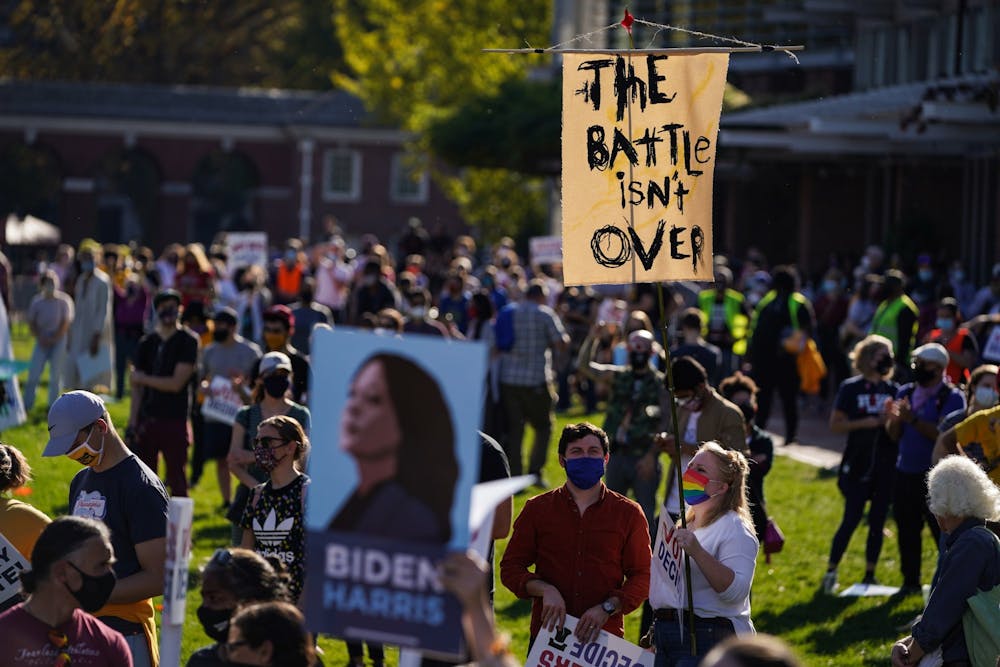
A supporter holding up a sign that reads “The battle isn’t over” at a Philadelphia Biden-Harris election victory celebration on Nov. 7, 2020.
Credit: Chase SuttonDuring his inaugural address, President Joe Biden emphasized a goal of unity, stating that he will be “a president for all Americans.” In his decades in the Senate and as vice president, Biden’s political record is characterized by his willingness to reach across the aisle and pass bipartisan legislation. It is clear he will attempt to unify the country with a similar attitude. He has toyed with appointing Republicans to high-ranking Cabinet positions and he will attempt to pass his $1.9 trillion COVID-19 stimulus bill, his first major piece of legislation as president, as a bipartisan bill. Although this approach seems it could potentially be effective, bipartisanship has often historically hurt the average American and Biden’s bipartisan stances are unlikely to be any different.
One might assume that when a piece of legislation is passed with bipartisan support, the actual substance of the bill will be supported by and benefit a majority of American citizens across party lines. However, there is a stark difference between issues that are bipartisan between the electorate from each party and issues that are bipartisan between legislators themselves. The bipartisan legislation that Biden has been a part of has largely been devastating for the American public.
The Grand Bargain, a failed piece of legislation during Biden’s vice presidency, proposed cuts to Social Security and Medicare while also raising taxes in the name of budget balancing, putting deficit hawkery above the needs of the people. This instance reflects a sentiment he has held throughout his senate career, advocating for freezing Social Security to lower the deficit on multiple occasions. This past summer, a bill proposed by Senator Bernie Sanders to cut just 10% of the country’s bloated military budget was scoffed at by Republicans and Democrats alike. Based on Biden’s pick for Secretary of Defense, a board member of the defense contractor Raytheon, and statements made by those in the industry, Biden certainly shares bipartisan resistance to addressing the military-industrial complex: the stranglehold large defense contractors have over government spending that funnels money away from domestic issues and keeps American soldiers abroad. In contrast, most Americans support increased funding for Social Security and cuts military spending.
Biden’s worst attempt at reaching across the aisle was the 1994 Violent Crime Control and Law Enforcement Act, also known as the 1994 Crime Bill. The bill, which called for increasing state prison funding, the size of the police force, the frequency of death penalties, and prison sentence duration has been accused of directly resulting in the mass incarceration of Black and Hispanic Americans today. That bill is the epitome of Biden’s history of being “tough on crime,” a phrase consistently uttered by politicians of both parties in the '80s and '90s. When bipartisanship is embraced for the wrong reasons, it causes substantial damage to our wellbeing and our history, all while politicians praise each other for a job well done.
Politics is much more complicated than a linear spectrum where a politician supposedly “in the middle” can concoct policy solutions that satisfy Americans spanning the political spectrum. The unfortunate truth is that elected officials’ interests are often unrepresentative of the general public’s. With wealthy donors having control over both the Democratic and Republican parties, it is clear who bipartisan policies truly serve. It is always possible for politicians to find common ground and collaboration is necessary for the country’s success. However, Biden’s record shows that his bipartisan attitude and the resulting legislation has not always been the best for Americans. Instead of praising politicians for simply reaching across the aisle, we must judge politicians’ intentions and success on the substance of their policy and their impact on the Americans who are the most in need.
Biden’s legislative legacy will undoubtedly be a bipartisan one, with both Democrats and Republicans likely to praise his accomplishments when it is all said and done. In and of itself, bipartisanship is not a bad thing, but current policies with bipartisan backing in Congress are often misaligned with what Americans support and are given a positive spin under the guise of bipartisanship. Biden’s brand of deficit hawkery, military spending, and being tough on crime is a prime example of how this bipartisanship in Washington frequently goes wrong. On the other hand, actual substantive policy positions held by a majority of Americans in both parties such as Medicare for All, and a wealth tax are unlikely to be passed. After four years of Biden reaching across the aisle, do not be surprised if life for the average American remains relatively stagnant and we are left wondering who really benefited from this bipartisanship.
MATTHEW LIU is a College sophomore from Allentown, PA studying biochemistry. His email is liumatt@sas.upenn.edu.
The Daily Pennsylvanian is an independent, student-run newspaper. Please consider making a donation to support the coverage that shapes the University. Your generosity ensures a future of strong journalism at Penn.
Donate







